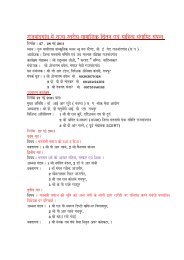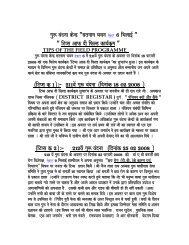Revolution and Counter-Revolution in Ancient India - Satnami.com
Revolution and Counter-Revolution in Ancient India - Satnami.com
Revolution and Counter-Revolution in Ancient India - Satnami.com
Create successful ePaper yourself
Turn your PDF publications into a flip-book with our unique Google optimized e-Paper software.
He gave the same positives <strong>and</strong> extended content to other precepts. One of<br />
the Buddha's lay followers once reported to him the teach<strong>in</strong>g of a non-<br />
Buddhistascetic, to the effect that the highest ideal consisted <strong>in</strong> the absence of<br />
evil deeds, evil words, evil thoughts, <strong>and</strong> evil life. The Buddha's <strong>com</strong>ment upon<br />
this is significant. "If, said he, "this were true, then every suckl<strong>in</strong>g child would<br />
have atta<strong>in</strong>ed the ideal of life. Life is knowledge of good <strong>and</strong> evil; <strong>and</strong> after that<br />
the exchange of evil deeds, words, thoughts, <strong>and</strong> life, for good ones. This is to<br />
be brought about only by a long <strong>and</strong> determ<strong>in</strong>ed effort of the will”.<br />
Buddha's teach<strong>in</strong>gs were not merely negative. They are positive <strong>and</strong><br />
constructive. Buddha was not satisfied with a man follow<strong>in</strong>g his precepts. He<br />
<strong>in</strong>sisted upon encourag<strong>in</strong>g others to follow them. For example <strong>in</strong><br />
the Auguttara Nikaya the Buddha is quoted as dist<strong>in</strong>guish<strong>in</strong>g between a good<br />
man <strong>and</strong> a very good man by say<strong>in</strong>g that one who absta<strong>in</strong>s from kill<strong>in</strong>g, steal<strong>in</strong>g,<br />
<strong>in</strong>-chastity, ly<strong>in</strong>g <strong>and</strong> drunkenness may be called good ; but only he deserves to<br />
be called very good who absta<strong>in</strong>s from these evil th<strong>in</strong>gs himself <strong>and</strong> also<br />
<strong>in</strong>stigates others to do the like..........<br />
As has been well said the two card<strong>in</strong>al virtues of Buddhism are love <strong>and</strong><br />
wisdom.<br />
How deeply he <strong>in</strong>culcated the practice of love as a virtue is clear from his own<br />
words. "As a mother at the risk of her life watches over her own child, her only<br />
child, so also let every one cultivate: a boundless lov<strong>in</strong>g m<strong>in</strong>d towards all be<strong>in</strong>gs.<br />
And let him cultivate good will towards, the entire world, a boundless (lov<strong>in</strong>g)<br />
m<strong>in</strong>d above <strong>and</strong> below <strong>and</strong> across, unobstructed, without hatred, without enmity.<br />
This way of liv<strong>in</strong>g is the best <strong>in</strong> the world." So taught Buddha [f35] .<br />
"Universal pity, sympathy for all suffer<strong>in</strong>g be<strong>in</strong>gs, good will to every form of<br />
sentient life, these th<strong>in</strong>gs characterised the Tathagath (Buddha) as they have<br />
few others of the sons of men ; <strong>and</strong> he succeeded <strong>in</strong> a most surpris<strong>in</strong>g degree <strong>in</strong><br />
h<strong>and</strong><strong>in</strong>g on his po<strong>in</strong>t of view to his followers. " [f36]<br />
Buddha held to the doctr<strong>in</strong>e of wisdom as firmly as he did to the doctr<strong>in</strong>e of<br />
love. He held that moral life began with knowledge <strong>and</strong> ended with wisdom.<br />
he "came to save the world, <strong>and</strong> his method for the ac<strong>com</strong>plishment of this<br />
end was the destruction of ignorance <strong>and</strong> the dissem<strong>in</strong>ation of knowledge as to<br />
the true values of life <strong>and</strong> the wise way to live. "Buddha did not arrogate to<br />
himself the power to save people. People had to do that for themselves. And the<br />
way to save lay through knowledge. So much <strong>in</strong>sistence did he place upon<br />
knowledge that he did not th<strong>in</strong>k that morality without knowledge was virtue.<br />
There are three th<strong>in</strong>gs aga<strong>in</strong>st which Buddha carried on a great campaign.<br />
He repudiated the authority of the Vedas.......... Secondly he denounced<br />
the Yudna as a form of religion. The attitude of Buddha towards Yadna is well<br />
stated <strong>in</strong> theJatakamala <strong>in</strong> the form of a story. The story runs thus :



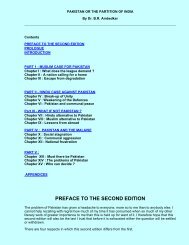

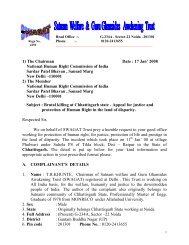
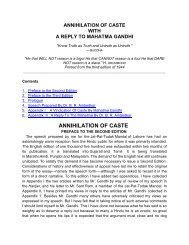
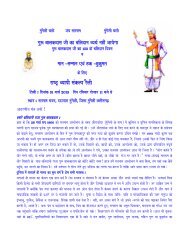
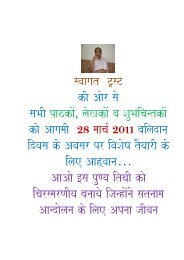
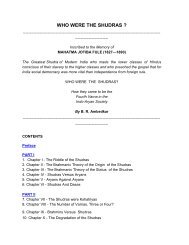

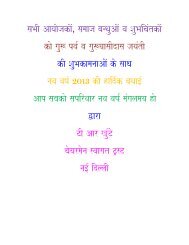
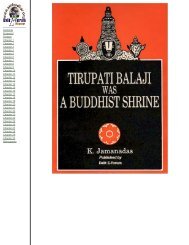
![saaQa satnaamaI saaQa satnaamaI ]%tr Baart ka mah%vapUNa ...](https://img.yumpu.com/5897453/1/190x245/saaqa-satnaamai-saaqa-satnaamai-tr-baart-ka-mahvapuna-.jpg?quality=85)
